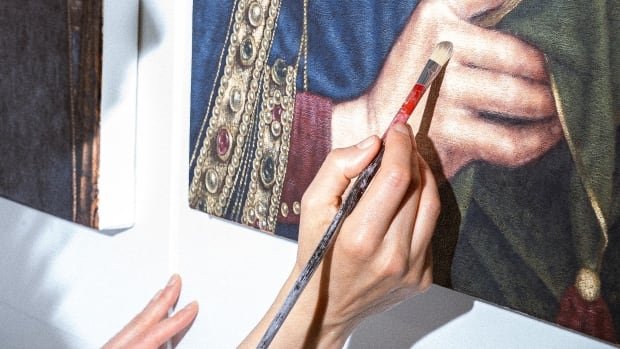One painting shows the glitzy jewelled clasp of a liturgical cloak. Another focuses on a hesitant touch between two figures. A third finds a woman wearing a head covering with tears streaming down her face.
At Franz Kaka, a small, second-floor gallery in Toronto’s west end, the pictures on display look like fragments torn from the treasures of the Uffizi or the Prado. Painter Jennifer Carvalho references and quotes such 15th-century masterworks because she feels that if you look closely at the details, these 500-year-old oils can tell us a great deal about our present time.

“I think about what I’m doing as a sort of archeology of art history,” the Toronto-based artist says during a phone interview. “I’m often mining objects and images from antiquity to the early modern period, interested in trying to create a connection between these historical narratives and the present.”
She began this work about five years ago, after reading Silvia Federici’s Caliban and the Witch. In that book, the Italian-American thinker reframes the witch hunts of the 16th and 17th century as part of a global economic shift. “It was just this aha moment,” Carvalho says. She wondered if she could excavate art history to create an understanding of the world around her.
In Ghost, the exhibition on display at Franz Kaka, Carvalho trains her eye on the Renaissance, cropping, compositing and reproducing in her distinctive painting style the works of artists like Rogier van der Weyden, Simon Marmion and Hans Memling. Within the images from this era of cultural and intellectual growth, the artist identifies the symptoms for some of the maladies of our current time.
“It was a moment of significant social change, the reverberations of which continue to be felt today,” Carvalho says. “We see a shift toward wage labour, the construction of working bodies and the rise of the individual.” She adds to this list “the loss of the common lands” and the expansion of private property. “I see these as important social shifts that contain the seeds for contemporary western democracies and their dominant ideologies.”

Focusing on select details from the source imagery, a set of motifs arise. Carvalho thinks of the architectural elements she includes as sets and framing devices. She’s inspired by the fantastical architecture of proto-Renaissance painter Giotto di Bondone, who would incorporate impossible structures influenced by the Roman classical period. “It’s just human tendency,” she says, “to rely on forms of the past to help us imagine going forward.”
Hands, as in the ones shown praying or pleading in An archive of gestures (hands and architecture with domestic interior), appear throughout the work. Carvalho finds them more expressive than the faces in Renaissance painting. The appendages form cryptic shapes and signals, which may have been understood by the audiences of their day. Here, however, clipped out of their original context, the hands become “unmoored” from intended readings, the artist says. Instead, they appear as signs — warnings maybe — whose meanings have been lost or perhaps are yet to be determined.

Depictions of jewelry, ornamentation, finery and other displays of decadence likewise abound. These luxuries were mainly cropped from renderings of saintly figures, the artist points out. “I think about that as maybe the very human desire to own these things.” Drawing a line to the present, all the gold, pearl and brocade read as evidence of conspicuous consumption, social stratification and inequity festering for centuries.
The final motif is perhaps the most striking. Alone and in groups, Carvalho paints women crying. Divorced from their original circumstances, the nature of their tears — either from rapturous joy or intense sorrow — is made ambiguous. “I like to think about them as a Greek chorus, commenting on the scene that appears before them,” Carvalho says. “I connect them to a contemporary feeling of anxiety, grief and mourning in this present moment, sadness for a world that never came to be or the world that we inherited or anxiety for the future.”

Carvalho paints all of this slowly, in thin layers, allowing each application to dry before she begins the next. The technique develops a texture on the canvas that creates a slow and heavy viewing experience. Her images appear patinated and spectral, woven like a tapestry or misty as if through time. “I’m trying to emphasize that these aren’t flesh,” she explains. “They’re copies or propositions or ghosts perhaps.”
She sees her work as a kind of hauntology — the return of elements from the past in the manner of a ghost. “I imagine that these objects and images continue to haunt the present moment.”
Carvalho’s paintings remind viewers that human history is connected from leaf to root. The past is no ash heap. Rather, if you look carefully, it can be read like a newspaper and tell us about our times. It may even hold the tea leaves that tell us where we’re headed.

Jennifer Carvalho’s exhibition Ghost is on view through October 12 at Franz Kaka in Toronto.

